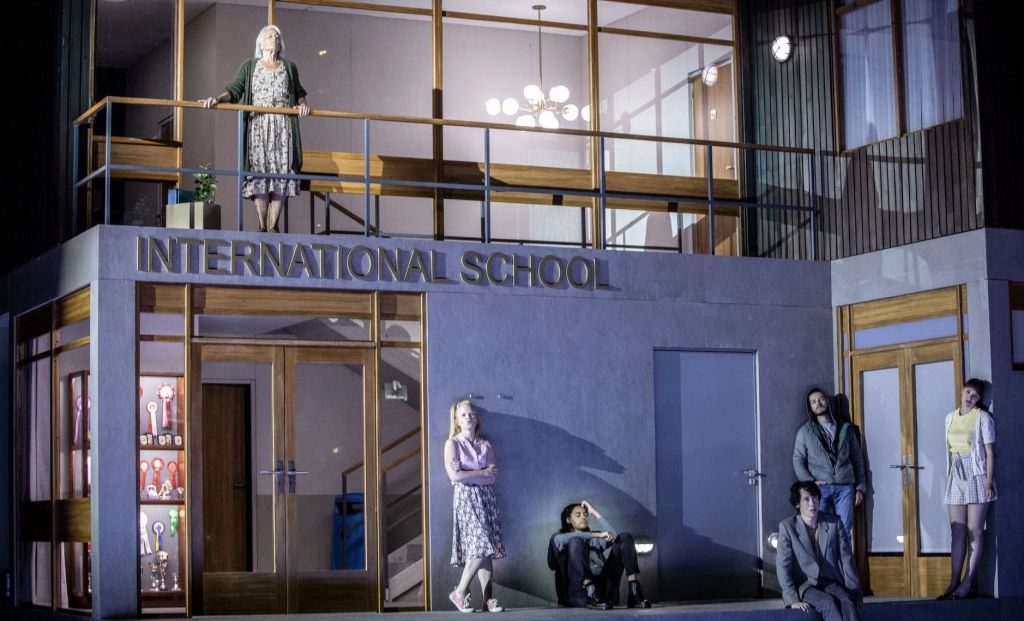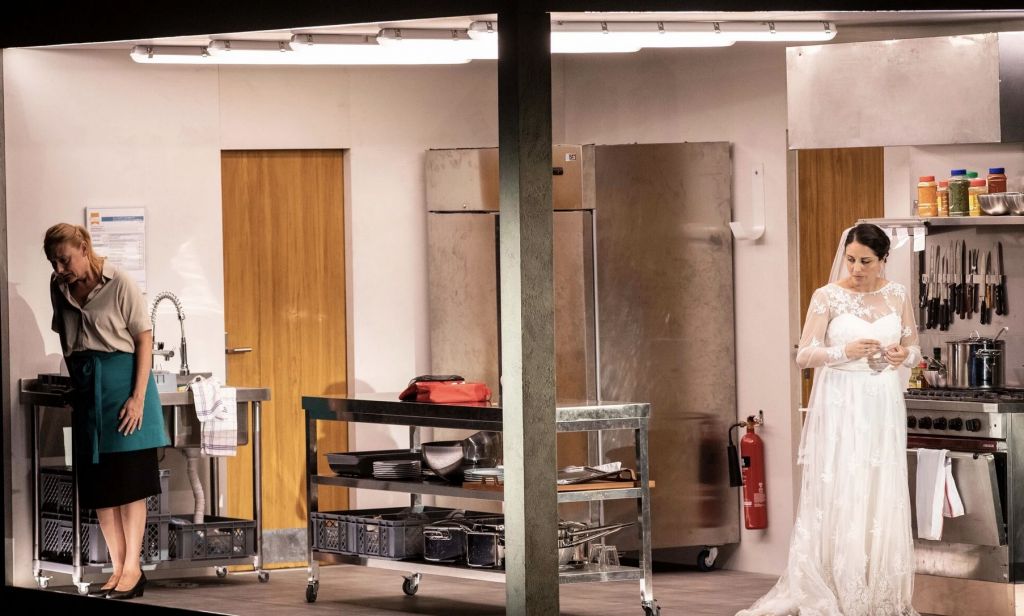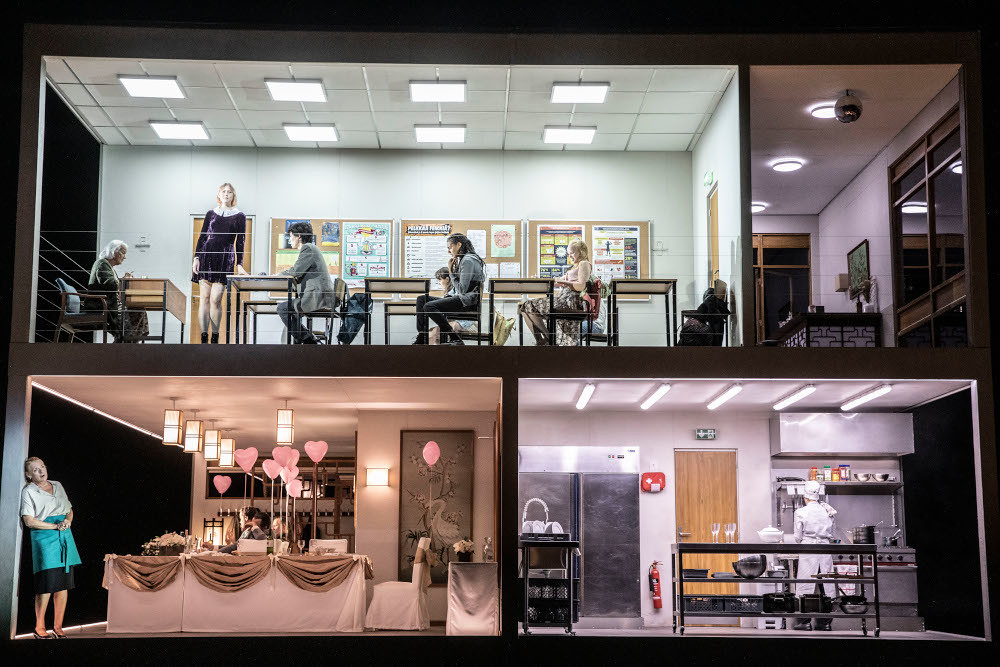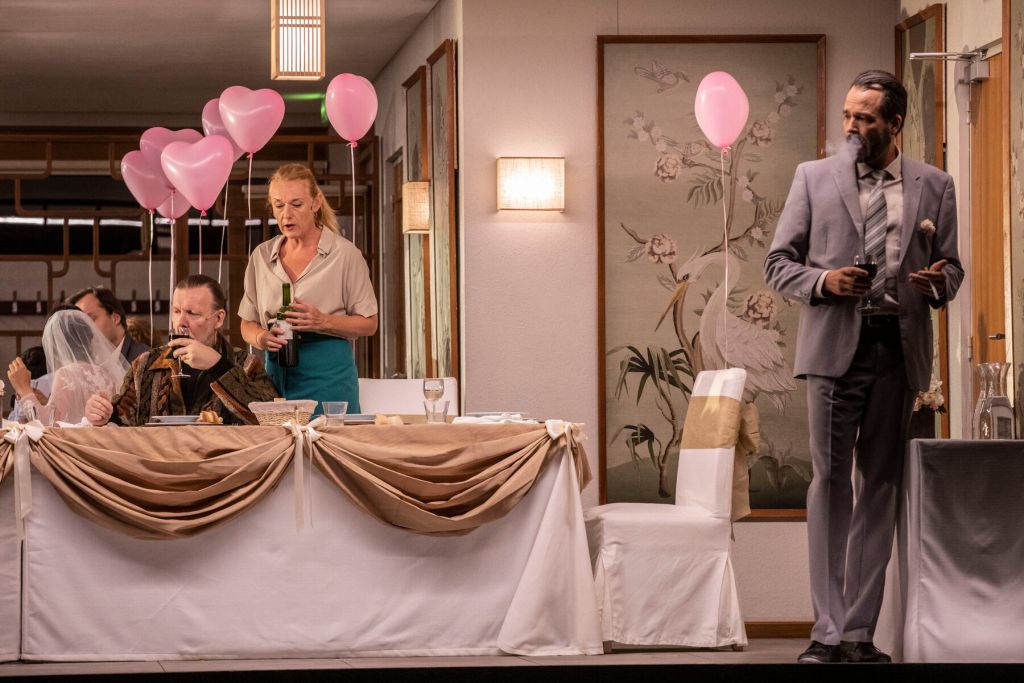The world premiere of Kaija Saariaho’s Innocence was the undoubted hit of this year’s Festival d’Aix-en-Provence. The Finnish composer, born 1952, is probably best known for L’Amour de Loin (2000), a haunting medieval meditation on love and loss as ephemeral as incense, yet once heard never forgotten. In her latest opera, however, she deploys her considerable craft to create something very much in the here and now, a topical work that is raw, uncompromising and utterly gripping.

Lucy Shelton (top), with Beate Mordal, Julie Hega, Simon Kluth, Camilo Delgado Díaz and Marina Dumont. All photos © Jean-Louis Fernandez/Festival d’Aix-en-Provence
Part Scandi-noir thriller, part Ancient Greek drama, Innocence makes for persuasive music theatre, thanks to Saariaho’s inexorable, multi-layered score and a spellbinding libretto by Finnish-Estonian novelist Sofi Oksanen that has more layers than the proverbial onion. Masterfully helmed by Australian director Simon Stone, it’s as theatrically mesmerising as it is emotionally harrowing.
It begins with a suspiciously subdued wedding taking place in an architecturally clinical hotel in Helsinki. The Finnish bridegroom is marrying a Romanian immigrant whose praise of her adopted society as safe, honest and free from crime should set alarm bells ringing from the get-go. As the story progresses, we become aware of a tragedy of ten years previous, involving a shooting at an international school. The gunman, it turns out, was the bridegroom’s brother, a fact the family has concealed from his new bride. A waitress, also an immigrant from Eastern Europe, who is covering for a sick colleague, is horrified to learn whose wedding she is forced to serve at – her daughter was one of the shooter’s victims.

Magdalena Kožená and Lilian Farahani in Innocence
What makes Innocence so compelling is the gradual laying bare of a tangled web of secrets and lies enveloping all concerned. What really happened? And who is to blame? It turns out there are no easy answers. For the waitress, time has stopped. Horrified, she sees the bridegroom’s family moving on with life toward “a future they are not entitled to”.
There’s an English teacher, who delivers her text in Schoenbergian sprechstimme, who was so traumatised by events that she scoured her students’ writings for years afterwards, looking for signs of instability – even taking them to a psychologist – before deciding that she was no longer fit to teach. The groom feels relief – and then guilt – when he hears of other shootings as it proves their family is not alone. A priest grapples with his faith, and we hear from both the victims of the shooting and those who survived and feel guilty that they did. The gunman is glimpsed behind a hoodie but never heard from, though it’s clear he has been bullied at school. The final reveal comes as deeply shocking.
Oksanen’s original libretto was in Finnish, but here it has been translated by Aleksi Barriere into multiple languages including English, French, German, Spanish and Romanian. Oddly enough, the result is anything but a 21st-century Tower of Babel. Whether you follow the subtitles or not – and the Aix Festival site only offers French and German – it all makes total sense. More than that, the opera’s intrinsic polyglot nature renders it a powerful metaphor for the grand European experiment and the difficulties around integration that it still faces in a post-Soviet Russia world.

Innocence at Festival d’Aix-en-Provence
Stone is a past master when it comes to probing psychological damage and his staging is accordingly rich in insight, as protagonists face trauma both past and present. Chloe Lamford’s two level set – the hotel is mostly below and the school up above – is set on an endless revolve that mirrors the churning emotions of the cast of characters. Mel Page’s functional modern costumes and James Farncombe’s brittle, exposing lighting do the rest. Particularly powerful are the flashback scenes where students huddle in bathrooms or cupboards to evade the gunman. The smeared blood on the walls is chilling.
Saariaho’s magnificent music is rich in ambiguities. Melodies on winds and often muted brass float free over wispy, insubstantial harmonies, aiding the temporal shifts forwards and back between the 25 scenes that make up the whole. Low piano, harp patter and percussion – the latter frequently jazz-inflected – lend a propulsive hand. Although the orchestration is generally lush, it’s an inherently bleak score that pivots from violence to aftermath with little hope offered at the end. But there’s spiritual uplift too in the weightlessness of Saariaho’s writing that somehow manages to wrap all that desolation up in a blanket of consolation.
Conductor Susanna Mälkki drives matters along with equal measures of precision and emotional cut and thrust. The London Symphony Orchestra delivers a translucent performance with offstage help from the eerie voices of the Estonian Philharmonic Chamber Choir.
The roles are mostly given archetypal titles rather than names. Heading the fine ensemble cast is Czech mezzo-soprano Magdalena Kožená as the Waitress, delivering a haunting bi-lingual performance, especially in the scenes with her daughter, Mareka, for whom she still buys gifts and who, it seems, ‘returns’ to visit her mother every year. Her touching exorcism at the end is one of the opera’s few rays of light. French soprano Sandrine Piau, singing with impressive clarity in English and French, captures the fears and regrets of the highly strung Mother-in-Law, with Finnish bass-baritone Tuomas Pursio offering solid support in a mix of English and Finnish as her husband.

Magdalena Kožená (left) and Tuomas Pursio (right) in Innocence
Soprano Lilian Farahani is outstanding as the wide-eyed Bride whose world frays and ultimately falls apart, with tenor Markus Nykänen vocally and dramatically powerful as the conflicted Groom. Lucy Shelton is a formidable presence as the devastated Teacher. Vilma Jää skilfully delivers the open-throated music for the Waitress’s daughter, which is influenced by Eastern European folk styles, and there’s outstanding support by Beate Mordal, Julie Hega, Simon Kluth, Camilo Delgado Díaz and Marina Dumont as fellow students, all of them spoken roles but seamlessly integrated into the score.
Whether video games, hunting trips or high school bullying ultimately contributed to the tragedy, Saariaho’s new work is less about who’s to blame and more concerned with how society and its individual members can learn to deal with it. Co-commissioned with Finnish National Opera, Dutch National Opera, Covent Garden and San Francisco Opera, and in partnership with the Metropolitan Opera, Innocence looks set to travel the globe. Let’s hope an intrepid Australian company or festival snaps it up soon and stages it down under.
Innocence is available on the Festival d’Aix-en-Provence website until the 1 November 2021. Watch here.
Look more: Limelight Magazine